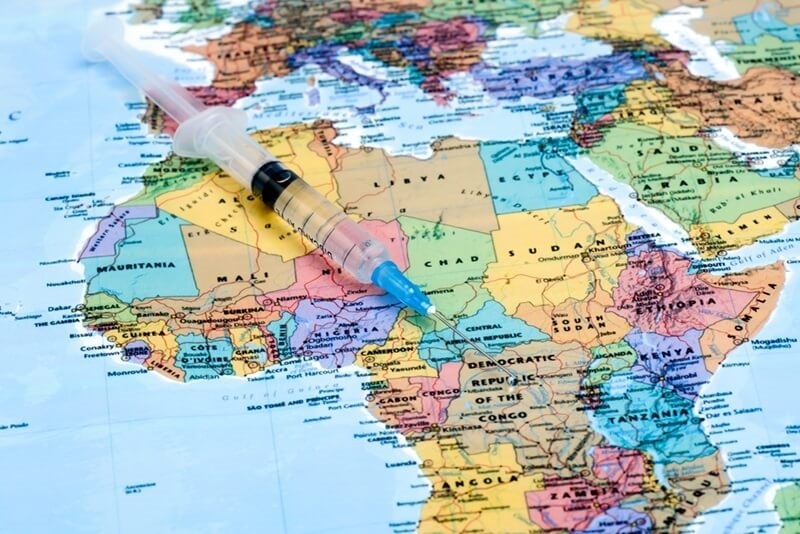Stay Healthy While Traveling in Africa: Essential Guide

Touring the expansive, stunning, and culturally diverse lands of Africa is an experience one will never forget. From the Kenya wildlife safaris to the dunes in Namibia and the bustling Nigerian cities, there is something for every traveler in Africa. Nevertheless, remaining healthy when traveling in Africa is a significant aspect of enjoying the trip. Whether one is traveling to far-flung villages or city centers, it is important to know how to keep oneself safe from harm.
During the first couple of days on your trip, interaction with new surroundings, alternate sources of food and water, and unknown pathogens can play a toll on your health. That is why traveling in Africa remains healthy and begins with preparation. From having your Africa travel vaccinations to knowing food safety facts about Africa and including the ideal travel medical kit in your luggage, this guide provides sound health advice for the traveler going to the continent.
Why Health Should Be a Priority While Traveling in Africa

Africa’s geographical and ecological diversity also brings a range of health challenges, including vector-borne diseases, water contamination, and foodborne illnesses. Medical infrastructure may vary by country and region, making prevention the best approach. Staying healthy while traveling in Africa not only ensures your safety but also enhances your ability to enjoy every moment of the adventure.
Schedule Your Africa Travel Vaccines Early
Vaccinations are perhaps the most significant step in maintaining good health when traveling to Africa. Depending on where you're headed, you'll need to provide evidence of certain vaccinations before you can enter the country.
Recommended Africa Travel Vaccines Include:
- Yellow Fever: Required for most African nations, especially Central and West Africa.
- Typhoid and Hepatitis A/B: Prevalent because of the risk of water and food contamination.
- Meningitis: Particularly relevant if traveling in dry seasons within the "meningitis belt."
- Rabies: Take into consideration if you'll be traveling through rural settings or working with animals.
- Polio and Measles Booster: Some places in Africa still have outbreaks of both of these diseases.
Check the CDC and WHO websites or visit a travel health clinic 6-8 weeks before you leave if you would like to make sure you have had all required and recommended travel vaccines for Africa.
Food Safety Advice Africa: Eat Smart, Be Safe
To stay healthy while traveling in Africa, you must Eat Smart and Drink Smart.
Foodborne diseases like traveler's diarrhea are prevalent, but avoidable by following some simple tips.
Food Safety Tips in Africa:
- Drink Bottled Water Only: Do not drink the tap water, ice cubes, or any beverages that might have been mixed with some local water.
- Eat Well-Cooked Food: Make sure that any food you do eat has been well-cooked and served hot.
- Peel by Yourself: If you do choose to eat fruits or vegetables, restrict your consumption to those that you have to peel or that you know have been cleaned with bottled or purified water.
- Exercise Caution with Street Food: Street food is fabulous, but always choose vendors with a lot of food turnover where you can see them following acceptable cleanliness practices.
Avoid Raw Dairy and (Raw) Meats: Don't buy unpasteurized milk and raw or rare meats, since they may harbor bacteria or parasites that could be harmful to your health.
By being cautious and following food safety tips in Africa, you can reduce the risk of stomach upsets and infections that would otherwise ruin your trip.
Malaria Prevention Africa: Don’t Take the Risk Lightly
Malaria is one of the top health risks in Africa, especially in tropical and subtropical areas. Since there's no malaria vaccine (except in select trials and children in high-risk areas), prevention is key.
Instructions for Preventing Malaria in Africa:
- Use Anti-Malarial Medicine: Your health provider will usually prescribe Doxycycline, atovaquone-proguanil (Malarone), or mefloquine. You will want to start it before departure and take it as prescribed once back home.
- Use Mosquito Repellent: Spray repellents containing at least 20–30% DEET on exposed skin.
- Sleep Under a Mosquito Net: Ideally treated with permethrin, especially in rural or outdoor accommodations.
- Wear Long Sleeves and Pants at Dusk: Mosquitoes that transmit malaria bite primarily during evening and nighttime hours.
- Avoid Standing Water Locations- These are breeding sites for mosquitoes.
Your health while traveling in Africa will be solely dependent on the level of seriousness with which you take a Malaria prevention plan. Preventing mosquito bites is not an option; it is essential.
Travel Medicine Kit Essentials for Africa
Your very own travel medicine kit is the best insurance against any unexpected illnesses, injuries or minor complaints when abroad.
What to Include in Your Travel Medicine Kit:
- Prescription Medicines: In sufficient quantities for the duration of your trip, along with copies of the original prescriptions.
- Anti-Malarial Medication: For pre-prescribed malaria prophylaxis in Africa.
- Antidiarrheal Medicines: For example, loperamide (Imodium) or oral rehydration salts.
- Antibiotics: For example, broad-spectrum antibiotics for food poisoning and/or infections.
- Basic Contents of Your First Aid Kit: Band-aids, gauze, antiseptic wipes, tweezers, and scissors.
- Pain Killers and Fever Reducers: Acetaminophen and/or ibuprofen.
- Medicines for Allergies: For example, use antihistamines for insect bites or food allergies.
- Hand Cleaner: For disinfecting hands when soap and water are unavailable in addition to disinfectant wipes.
Make your travel health kit portable, clearly labeled, and separated by your health history and destination.
Health Advice for Travelers to Africa: Before, During, and After
Pre-travel health thoughts are not over after your vaccination visit or a thoroughly written list in your suitcase. Just ensure you follow these best practices at each stage of travelling!
Before departure:
- Visit a travel health clinic to receive vaccinations and prescriptions.
- Buy comprehensive travel insurance that covers medical evacuation.
- Read about local health hazards, customs, and facilities.
- Bring a personalized travel medical kit with the key items.
While You're in Africa:
- Adhere to the food safety guidelines in Africa outlined above.
- Practice malaria prevention measures daily.
- Wash your hands frequently and apply sanitizer when soap is not available.
- Do not swim in any freshwater lakes or rivers (risk of schistosomiasis).
On Your Return:
- Be aware of symptoms of fever, fatigue or gastrointestinal problems.
- If you have symptoms of malaria or any other tropical disease, seek medical attention immediately.
- If you suspect you may have had any health risks while traveling, make an appointment with your physician for follow-up.
With this comprehensive health brief for travelers, you'll arrive home healthy, safely, and with many great memories.
Additional Health Considerations for Particular Area of Africa
Africa is so vast and diverse, health precautions may change depending on where you are heading.
North Africa (e.g., Egypt, Morocco):
- Be cautious of food and water safety because of the high incidence of traveler's diarrhea.
- Lower likelihood of malaria but extremely hot summer temperatures, understand the effects of heat exhaustion.
Sub-Saharan Africa (e.g., Kenya, Uganda, Ghana):
- Preventative efforts against malaria in Africa are so important here.
- Yellow fever vaccination is commonly required.
- Typhoid, cholera, and hepatitis A and B very high risk.
Southern Africa (e.g., South Africa, Namibia):
- Generally modern health care in municipalities.
- Follow strict food safety precautions in Africa and remain vigilant regarding wildlife-induced trauma.
Smart Hydration and Sun Protection
Behavior under the African sun can dehydrate quickly, especially on safari or if traveling long distances.
Hydration:
- Drink minimum 2–3 liters of bottled water per day.
- Drink oral rehydration salts when experiencing diarrhea or excess sweat.
Look after Yourself in the Sun
- Use SPF 30+ sun lotion daily.
- Wear your hats, sunglasses and loose, light clothing.
- Avoid direct sun during the hottest part of the day (11 to 3).
- Heat stroke and sunburn are real threats—don't get fooled by the African climate.
Local Medical Services: Know Before You Go
Check out local hospitals, clinics, and pharmacies in the towns or cities you will pass through before you leave. Not all the medical care facilities will be the same, especially if you're traveling far from home. Take a local emergency contact card with the names and phone numbers of the embassy or consulate (if it's close by). Download some offline maps, with the closest medical centers highlighted if you find yourself in the worst situation.
Respect Local Health Practices and Cultural Customs
Being respectful of local customs, cultural practices and health traditions not only show punctuality but also helps to avoid misunderstandings.
- Ask permission first if you want to take a photograph in clinics or markets.
- Do not touch locals or sacred things until you understand the cultural practice.
- Be aware that in some areas, people may put distance between them and those who have visible symptoms during outbreaks.
In being mindful and respectful, you are protecting your health but also creating meaningful connections in your travels.
Conclusion: Protect Your Health While Traveling in Africa
Africa is a world of exploration – an abundance of cultures, stunning views, and new experiences. In order to enjoy it all, you must plan wisely. To be healthy while traveling in Africa is not avoidance; it is smart prevention. With proper Africa travel vaccines, rigorous adherence to food safety guidelines in Africa, regular malaria prevention, and a solid travel medical kit, your journey will be safer, healthier, and much more rewarding.
Don't leave your health to chance. Use the health advice for travelers outlined in this guide and take every step to stay protected while exploring this incredible continent.
This content was created by AI

